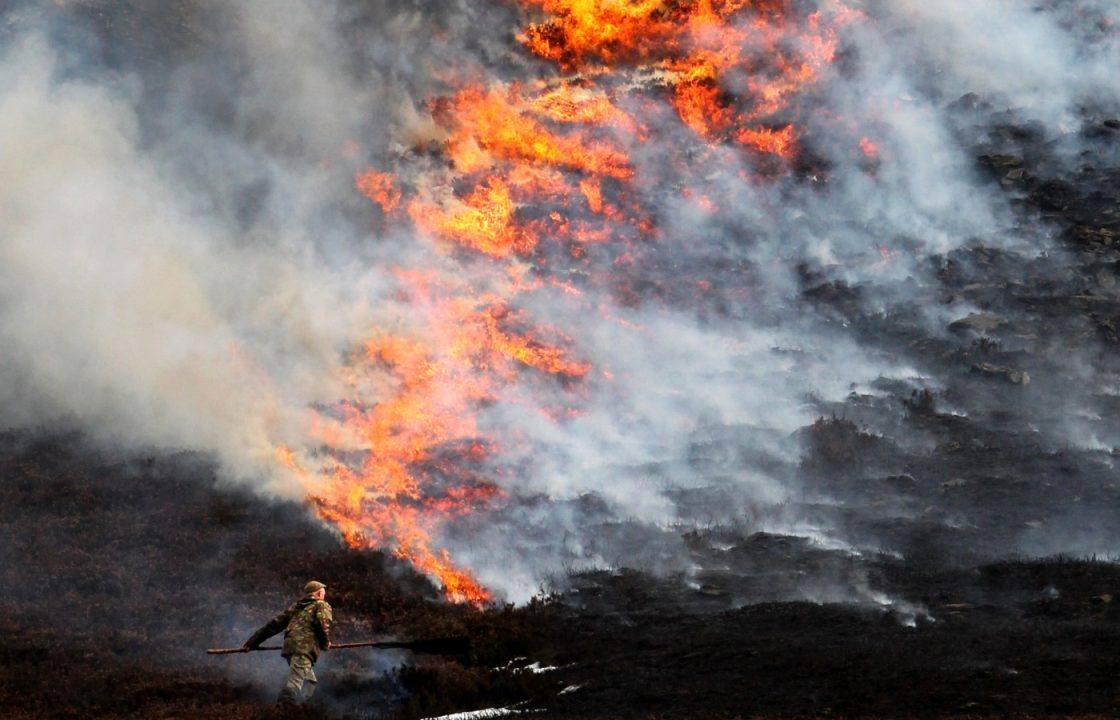A landowners’ group has welcomed the Scottish Government’s decision to again delay the implementation of muirburn licensing.
Scottish Land & Estates said licensing will cause challenges to implement, and in turn lead to further wildfires due to overgrown vegetation.
Ross Ewing, director of moorland at the organisation, said: “Muirburn, as carried out by estates, gamekeepers and land managers across Scotland, remains an essential tool in mitigating the growing threat of wildfires.
“Its importance to effective upland and moorland management cannot be overstated, and we welcome (agriculture minister) Jim Fairlie’s decision to listen to stakeholders and pause the introduction of licensing.
“Without this delay, the ability to undertake controlled muirburn would have been significantly constrained, increasing the build-up of vegetation and, in turn, the risk of wildfire.”
Muirburn is a method often undertaken by landowners. It involves the controlled burning of moorland vegetation, primarily heather.
The main purpose is to encourage new heather growth for grouse and other animals to feed on, but it also gets rid of excess vegetation which can fuel wildfires.
Widespread wildfires hit the Carrbridge and Dava areas of northern Scotland in June and early July. When combined, the fires became the largest such event in Scotland’s history, burning more than 11,000 hectares of moorland and forestry.
Mr Ewing continued: “If we make it harder for skilled land managers to carry out preventative muirburn, not only will we see fuel loads increase, but we also risk losing the very infrastructure and expertise that helped contain these recent fires. That would be catastrophic for rural Scotland.”
In March, the Scottish Parliament voted for the Wildlife Management and Muirburn (Scotland) Bill, which introduced a requirement for all muirburn to be licensed. It was first delayed to start in January 2026.
On Thursday, agriculture minister Jim Fairlie said licensing will not now be implemented until autumn 2026.
He said: “Delaying the implementation of the muirburn provisions until the start of the next season in autumn 2026 gives us more time to carefully consider how these necessary changes to licensing can be brought forward in a way which does not adversely affect our ability to prevent and respond to wildfires.
“As we have all seen this summer, wildfires are very damaging to Scotland’s landscape, wildlife and particularly to our precious peatland carbon stores that are vital in tackling the climate and biodiversity crisis.
“I repeat my thanks to all those involved in getting the wildfires under control and for their continued engagement as we look to be better prepared in the future.”
Fairlie said the decision followed discussions with land managers, game keepers, estate owners and the Scottish Fire and Rescue Service.
However, environmental groups and the Greens have been critical of the delay as muirburn has the potential to damage peatlands, which play an important climate role in locking up carbon, and can have a negative impact on other wildlife.
Scottish Green MSP Arian Burgess accused ministers of putting the interests of wealthy landowners ahead of environmental protection and public safety.
She is calling for the immediate implementation of licensing, and said: “This is deeply disappointing. We have just had a summer of devastating wildfires across Scotland and it is vital that we act rather than backtracking. Yet again, the SNP is bending to the demands of wealthy landowners.
“During the scrutiny of the Wildlife Management and Muirburn Act we took detailed evidence on the role of muirburn in wildfire risk. There is very little credible evidence to support the hunting and shooting lobby’s ridiculous claim that these practices have any role in preventing wildfires.”
RSPB Scotland also criticised the delay and said it was “deeply disappointed” the practice has not yet been regulated.
Duncan Orr-Ewing, head of species and land management at the charity, said: “RSPB Scotland is deeply disappointed that yet another delay to the implementation of the muirburn provisions of the Wildlife Management and Muirburn Act 2024 has been announced by the Scottish Government.
“Concern over wildfire in the uplands of Scotland unites a broad spectrum of land managers, particularly in the wake of this year’s fires. RSPB Scotland sees improved regulation of muirburn as a part of the solution.
“Muirburn as a practice has been very weakly regulated since the Second World War and there were many examples of poor practice leading to negative impacts, including starting wildfires.”
Follow STV News on WhatsApp
Scan the QR code on your mobile device for all the latest news from around the country


 PA Media
PA Media

























